Text
So we handed in an article 6 minutes before the deadline XD (We had almost 6 months to write it.)
0 notes
Text
Checking in with the doc
I'm on a higher dose of meds (atomoxetin) and that small capsule works like magic for my regulation problems - mostly emotional. No spiraling, no anxiety yayyy! But I also munch less, and eat way less.
However, my executive dysfunction is still very bad. This week I asked my doctor what to do with it, and he said there is a new stimulant-type med, that is kind of like ritalin, but better, and it also has a more balanced absorption rate. I'll look into it so I can decide during the summer if I want to try it, or if I'm sticking with this.
0 notes
Text
"ADHD is like a superpower!"
Okay well you figure out the best use of the power Forgetting to Pee Until it's an Emergency, then let me know.
43 notes
·
View notes
Text
What a surprise that I'm not consistent with this XD
So. Historic day! I took my first pill. It's not a meth derivative, my meds will work by absorbing them for a month. If they work, bc there's a 0.5 chance they won't. We'll see.
In the meantime: I successfully executive dysfunctioned a horribly big and boooring task until today. I need to get it done by tomorrow morning and it's not a day's work. I actually had a month to do it, but... You know...
0 notes
Text
Body Doubling for ADHD and Autistic People
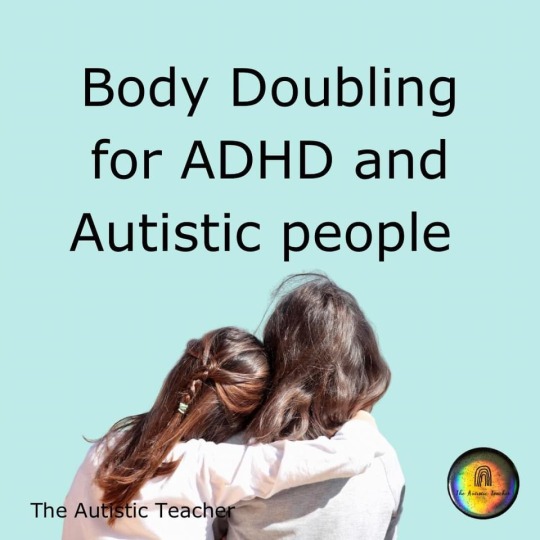
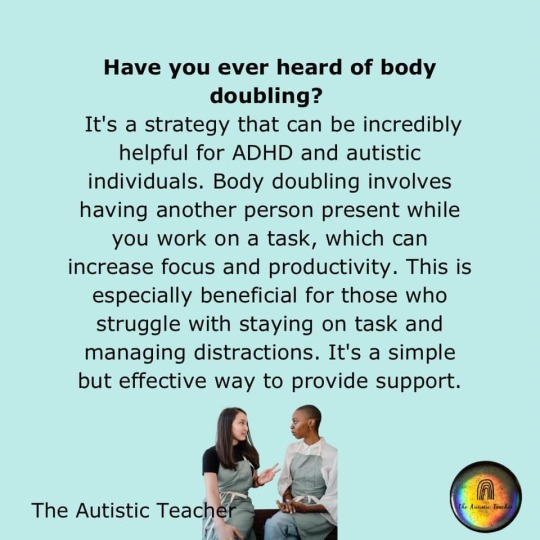
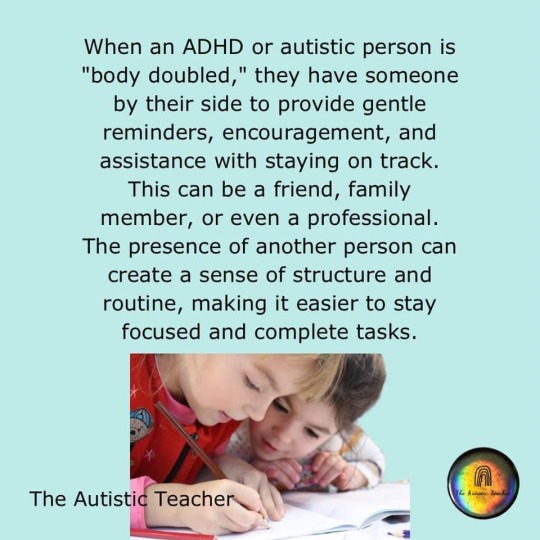
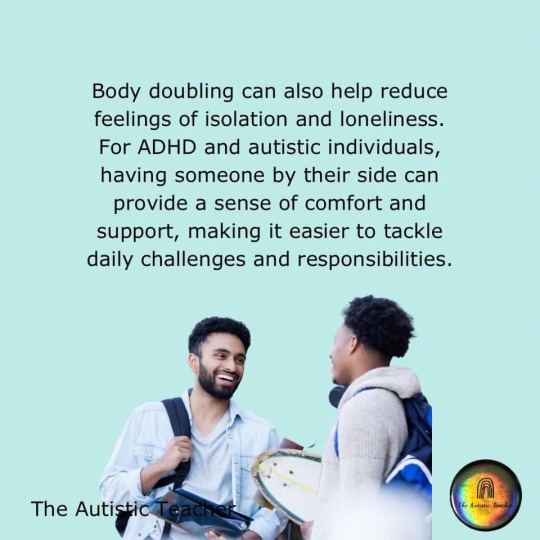
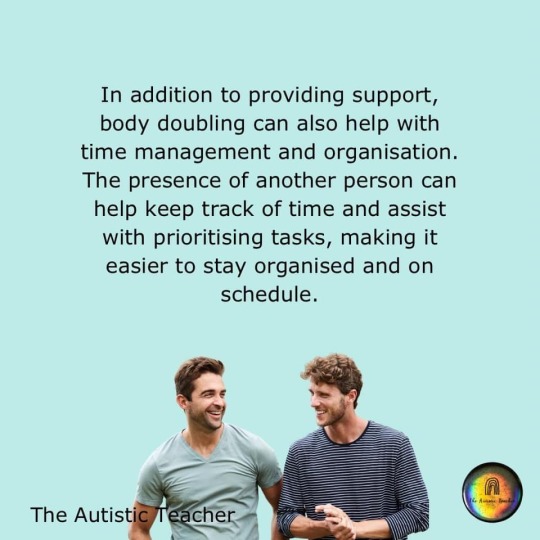

The Autistic Teacher
#adhd#autism#body doubling#helpful#neurodivergence#neurodiversity#The Autistic Teacher (Facebook)#actually neurodivergent
276 notes
·
View notes
Text
I had a similar conversation with my mum and granny after getting my dx. Mum said she didn't notice I was struggling (with mostly forgetting things and extreme executive dysfunction, therefore heavy anxiety) bc I was always such a closed off kid and I never told them when I had problems. Turns out that at first I did tell them, but I was always shot down with "interesting, only you have a problem with this".* So after a while I didn't even dare to mention anything. Even today I still filter what I tell my family, and what I only share with my husband.
The root of my confusion was that normally I am a hardcore oversharer and always so open with my thoughts and feelings. Apparently, my family saw everything in a completely different way due to my early masking and me shutting them out. In certain cases they only realized I was bullied bc I slipped up and accidentally mentioned something I initially didn't even want to tell them. And I hadn't even realized until that convo that I shut them out.
* Even if only I have a problem with it, shouldn't we talk about it???
My mom was all like “you were better with time management before you knew you had adhd!” And I’m like no I’m just in my last few months of being an IB diploma student I have a lot more work.
And then she was like “I raised you and you never had attention issues! When you were a kid in school, you would get into the subject and get upset and confused when you had to move on—you didn’t have attention problems,you had problems transitioning between tasks!”
I love my mother. She is super smart. She has a PhD in a different field from Princeton and I trust her with almost everything. If she can look me in the eye and use the phrase “you had problems transitioning between tasks” to convince me I used to not have symptoms of adhd… no one is immune to misunderstandings about how adhd works.
131 notes
·
View notes
Text
Yup. I also needed to rationalize my achievements, bc they don't feel like achievements. I don't feel accomplished, just constantly stressed and overwhelmed.
people say folks with adhd struggle with "delayed rewards" aka long term goals and as such we tend to focus more on short term rewards. what they don't talk about is that at when we Do accomplish long term goals we don't actually feel anything proportionate to the amount of work we did to achieve it. In my head I suffered for a while and then money spontaneously appeared in my bank account.
131K notes
·
View notes
Text

285 notes
·
View notes
Text
Or take up a new hobby. I'm most creative in a new field when I have a lot of work to do. XD
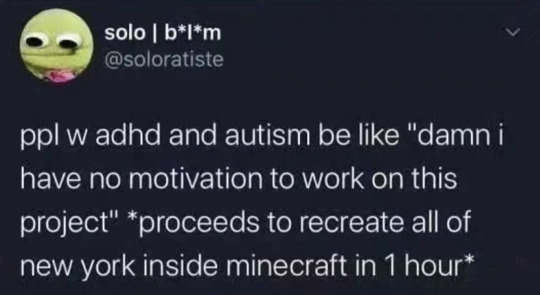
97K notes
·
View notes
Text

548 notes
·
View notes
Text
“how’s the writing going?” i’m glad you asked! my room has never been cleaner and i’ve decided to take up baking
95K notes
·
View notes
Text
Y’ever read something and have understanding that has eluded you interminably suddenly stop, curl up, and snuggle neatly into a fold in your brain because a new way way opened to it?
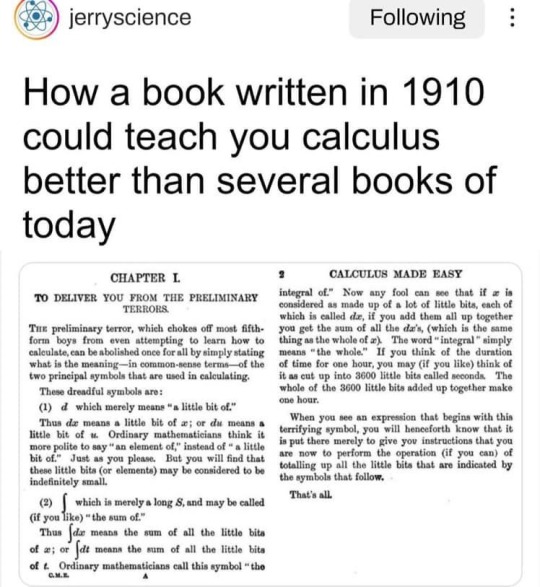
208K notes
·
View notes
Text
Since I came across this post years ago (pre-covid), I've been encouraging students to do this. Some groups are very receptive and quickly get the hang of it - usually their learning processes become more interactive, faster and more effective. But some groups are not willing to collaborate at all.
I have a few ways of incentiveizing cooperation, but sometimes I completely fail at it. In these cases it's mirrored in students' results and actual level of insight and knowledge. I know I can't motivate everyone, but when this happens I still feel like I haven't done enough.
Background info: our uni uses Microsoft 365 with Teams, so in all my courses the main platform for communication, collaboration, sharing class materials and handing in assignments is MS Teams. I really like the organization options that come with the software. 90% of the classes are in-person, and we even record those class meetings so students always have the option to watch it back if they missed something. Therefore students actively use Teams for all my classes. To summarize: we have the infrastructure and support for easy collaboration.
Ideas for encouraging collaborative work I gathered so far besides cool group projects:
Rewarding: students get points for creating common knowledge bases, or if at the end of the semester they need only a little bit to get a better grade, their collaboration is taken into consideration. These methods basically use gamification elements.
Forcing them to collaborate by creating a suitable scenario: e.g. I require them to come to a concensus about certain topics and make them stick with those in cases that require them to at least have a shared list of these concenses. This is an easy trick, and provides the basis for the next one.
Taking responsibility: basically emotional manipulation. Explaining the merits of working together and kind of pressuring them into it with making them realize how they rely on each other to actually finish a project. This method relies heavily on the students' sense of accountability.
Changing up roles: cooperative group roles can be interchanged for different phases / projects. Students need to agree on who contributes how, teacher flexibility might be needed. With this method, special needs can be accommodated, and motivating is easier if students can play to their strengths. (Then later on, we can work on their weaknesses by adjusting the roles as such.)
Feedback and positive reinforcement: continuously monitoring students' notes and process, giving valuable feedback, praising progressive contributions, recognizing good work and work ethics.
In each case I used words like "forcing" or "making them do things" I meant them only in a functional way. Long-term productivity and a real change in engagement and learning can only be achieved if I can make my students willingly cooperate. I need them to want to do this, and not do this against their will. A supportive and positive learning environment is the most basic element of any of this to work.
I'm not saying that collaboration MUST happen in a classroom setting (even though it has great benefits), but I have classes where students (mostly teacher trainees) need to learn to work together in a way that they will also be able to apply this technique in their own teaching.
I've found that with primary and secondary school children it's easier, but college students are way more difficult to motivate.
I'm open to ideas and good practices how I can make the unwilling students to at least work together, or make any group project / student collaboration better!

1K notes
·
View notes
Text
me looking at my research, my research looking at me, me looking at my research, my research looking at me, me looking at my resea

11K notes
·
View notes
Text
Infinite amount of papers in the office room, desk and cabinets full of them: we need to be sorted
Me: *doing the dishes, cleaning the stove top and the kitchen counter, filling my pillbox, starting the washing machine, doing daily planning and journaling, refilling the ironing water bottle*
Infinite amount of papers in the office room, desk and cabinets full of them: ... and what about us?
Me: *actually wanting to do the papers, but instead pairing & folding & putting the socks away*
Me: this is ridiculous
1 note
·
View note
